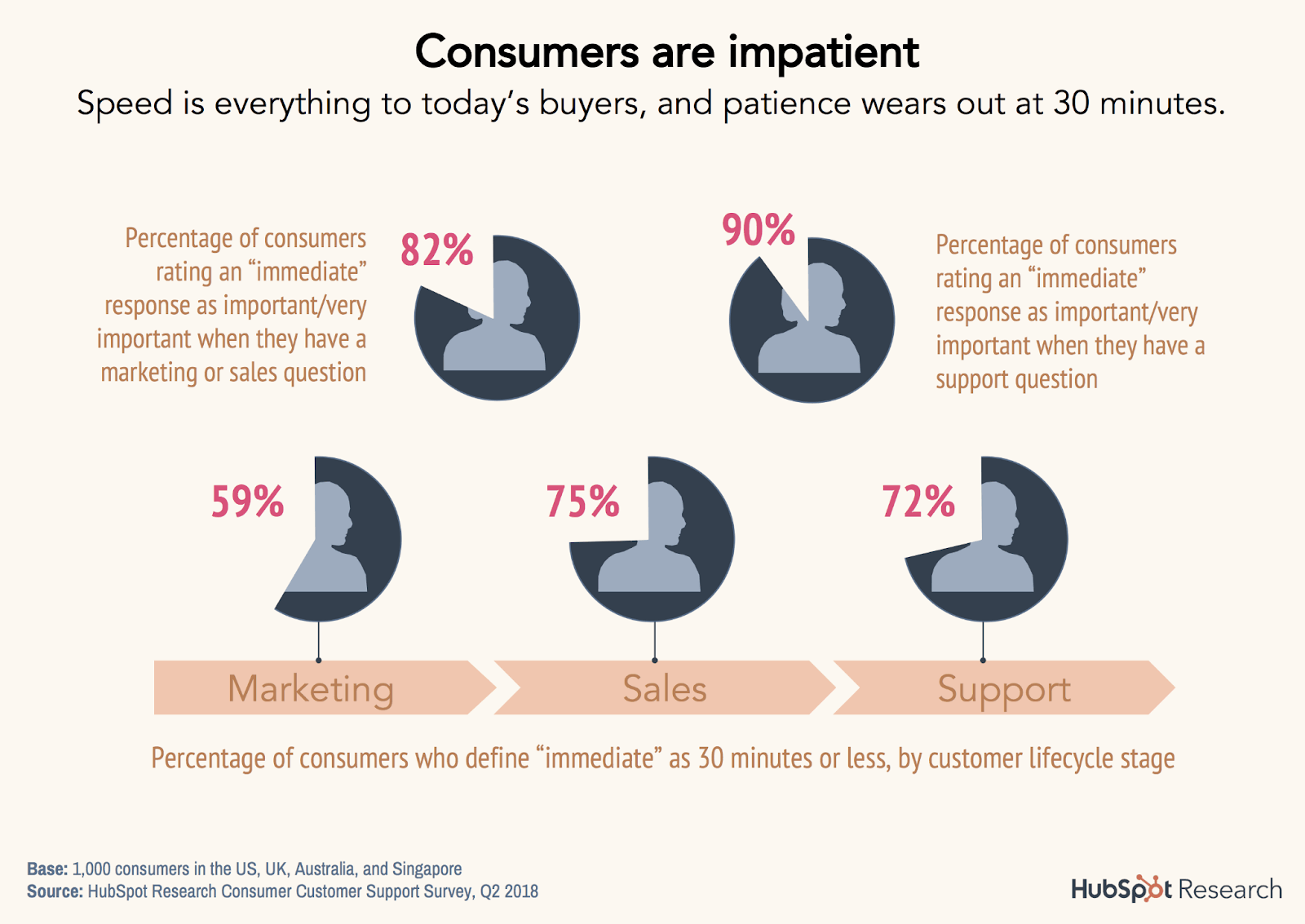Whether it’s nightmares about angry callers or because you’re actually trying to finish replying to all your customers, there’s a solution to your problem — customer service outsourcing.
Here’s what you should know about delegating CS tasks to a virtual customer service assistant:
Why customer service outsourcing is beneficial for your business
The way you deal with consumers directly affects brand loyalty.
A Microsoft Dynamics 365 report revealed that 95% of their respondents saw customer service as a big factor in choosing a brand. 61% also stated they deserted a brand after a poor encounter with customer support.
So if you’re keen on keeping your customers loyal, you have to give them a stellar experience. This is where a customer service remote representative comes in handy.
By opting for outsourcing customer service, you can streamline operations and boost performance without sacrificing service quality.
By delegating things like chat and voice support to a Philippines virtual assistant, you can:
Save money
Sure, you can save more now by providing customer support yourself, but that’s not exactly sustainable in the long term.
You know what is, though?
Hiring a customer service virtual assistant from the Philippines. With a headhunter agency like Somewhere, you can find one that costs 80% less than local equivalents but does just as great a job. That translates into significant cost savings for your business.
Read More: Why You Should Hire Remote Staff from the Philippines
Increase customer satisfaction

Folks these days aren’t the most patient bunch. According to a study by HubSpot Research, 90% of customers consider short wait times important when they have concerns.
That's why you need a dedicated virtual customer service expert or two. They'll ensure queries get answered ASAP and help maintain your company's reputation for excellent customer service and higher customer satisfaction.
Win back your time
Having a skilled Filipino virtual assistant in charge of customer service means you no longer have to spend odd hours answering urgent concerns. You'll finally get better sleep, plus more time to focus on your personal life. That's the beauty of outsourcing customer service: you get a competent support team without stretching your time thin.
What are the challenges of customer service outsourcing?

Now, let's move on to the issues that may be discouraging you from delegating outsourced customer service (and what you can do about them).
Data security
With great trust comes great responsibility.
Your customers give you access to data like their address and phone number, so we get your hesitation about customer service outsourcing. You’re not alone, 81% of companies across the globe are concerned about potential data breaches by their outsourced staff.
But you can lessen the likelihood of data breaches by:
- Requiring non-disclosure agreements (NDAs)
- Providing minimum access
- Using secure platforms to share data
- Teaching your team about good digital hygiene (e.g., avoiding public Wi-Fi, knowing what phishing emails look like, etc.)
Related: How to Share Confidential Data with Your Virtual Assistants
Language barrier
Worried a language barrier may affect the service quality your customers receive? Don't be. English is widely used around the Philippines, so you won't have a hard time finding a Filipino virtual assistant fluent in the language.
At Somewhere, we also require all applicants to take an English proficiency test so you’re guaranteed to have the best of the best.
Lack of subject matter expertise
This is a legit concern, but it shouldn’t be a problem if you provide comprehensive training and resources.
Preparing a knowledge base of product information, FAQs, and other important details will help your outsourced customer service rep a lot. You can also include product demos during the onboarding process so they can really visualize how your items work.
How to outsource customer service tasks to your Filipino virtual assistant

Ready to start delegating some tasks to your customer service remote assistant? Here are the things you need to do:
1. Identify which CS tasks to assign
What customer service operations are you doing yourself? Which ones are repetitive or take the most energy? Can someone else do them instead?
Knowing the answers to these questions should be first on your agenda. This will help you narrow down what to delegate.
Here are examples of responsibilities you can probably hand off to your virtual customer service assistant:
- Answer customer inquiries through email, live chat, or phone
- Process orders, refunds, and exchanges
- Keep an eye out for customer complaints on social media and reach out to them
- Identify common issues with products or services and relay them to team members
2. Pick your collaboration tools
Collaboration tools are non-negotiable when you work with a remote team. These include communication channels, project management platforms, and support tools.
Let’s talk about each one:
Communication channels
Apps like Slack or Discord allow you to get in touch with your assistant right away, so they’re perfect for urgent concerns and quick huddles. Meanwhile, video conferencing platforms like Zoom or Google Meet are ideal for company-wide meetings.
Project management platforms
These make it easy to keep track of tasks. You can see who’s assigned to do what, what tasks are in progress, and which items need approval.
Examples of project management tools:
- Asana
- Basecamp
- ClickUp
- Trello
Support tools
Virtual customer service reps use support tools to manage customer concerns and inquiries. Typical tools include:
- Live Chat Software: As the name implies, this enables your customer service virtual assistant to provide real-time support when customers send a message on your website or app. Examples of live chat tools include Zendesk, Gorgias, and Intercom.
- Help Desk Software: This is where customer support tickets are made and assigned. It often integrates email and also shows reports like average response time and number of conversations handled. Zendesk and Gorgias also have help desk features, but if you’re looking for other options, try Helpscout, Zoho Desk, or SysAid.
- Customer Relation Management (CRM) Software: Among other things, CRM software is where you store customer data. It makes it possible to access their complete history with your company in just a few clicks. HubSpot and Salesforce are two popular CRM tool examples.
3. Create SOPs

Remember the list of tasks you plan to delegate? Well, you’re going to create standard operating procedures (SOPs) for every one of them. Each SOP should include:
- The task name
- The task’s purpose
- Detailed steps for completing the task
You have the option to write your SOPs, make slides, or create video walkthroughs.
Related: How to Level Up Delegation with SOPs
4. Create a knowledge base
A knowledge base is basically a collection of everything there is to know about your products or services. It helps your outsourced customer service rep provide the correct information to your customers. You can create your knowledge base on Notion, save it to your company server, or add it to Asana or ClickUp.
Here are examples of things to include in your knowledge base:
- Product specifications
- Warranty information
- Frequently asked questions from customers
- Best practices (ex. how to handle an irate caller)
5. Prepare templates

Ready-made templates save your Filipino virtual assistant time, prevent grammar errors, and ensure your brand’s voice is consistent. All they have to do is choose the appropriate template and tweak it to customize their response.
You’ll want to make templates for things like:
- Order updates
- Requests for refund or return
- Troubleshooting
- Positive and negative reviews
PRO TIP
Use ChatGPT to help you write the templates. It’s much faster than doing it from scratch. Here’s a neat article that teaches you how to craft CS templates and more via this AI tool.
6. Assign gradually
Let’s be real: you can’t expect your Filipino virtual assistant to start responding to customers on day 1, even with SOPs and scripts in place.
You’ll need to get them settled in their new role first. That might mean creating a training schedule like this example:
- Week 1: Product demos and walkthrough of tools
- Week 2: Go over SOPs and have them practice responses for different scenarios
- Week 3: Assign them basic tickets and approve their work
- Week 4: Give them the go signal to respond to tickets on their own
7. Communicate, communicate, communicate
Schedule 1:1s with your customer service virtual assistant to ask how they’re doing and give feedback on their work. Do this regularly, like every week, so they’ll feel more comfortable talking to you. You can also use some of the sessions to review challenging tickets or ask for their advice on what products to improve.
Step up your customer service game with help from a Filipino virtual assistant
Customer service outsourcing can make or break brand loyalty, so make it a priority for your business. Delegating it to a customer service outsourcing company or customer service remote assistant speeds up response time and gives you more room to focus on business growth.
Some businesses opt for in-house customer service, but many companies outsource customer service to benefit from the flexibility and cost efficiency. Customer service outsourcing companies in the Philippines offer specialized technical support and high service quality.
Whether you're managing an in-house team or exploring offshore customer service, the goal remains the same: a seamless customer experience and dependable customer care.
If you're ready to outsource customer service, allow our team at Somewhere to help. Send us a message today.
FAQs about outsourcing customer service














